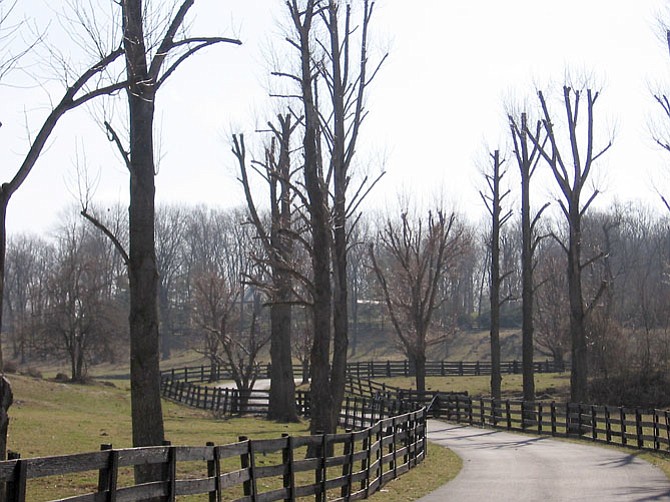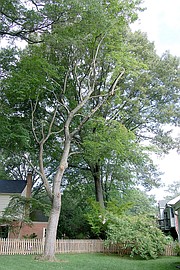Malpractice in the tree care industry, according the Fairfax County Urban Forestry Division, includes “topping trees,” with the results shown in this photograph. Photo Contributed by Fairfax County Urban Forestry Division
An elderly widow recently answered the doorbell in her suburban Mount Vernon home. Standing on her porch was a stranger who offered tree care services and noted that he had worked for a neighbor across the street. The man then added that limbs on a large maple behind her house posed a danger to her and her house. He offered to remedy the problem immediately for $1,700, but with no written estimate. The woman asked the man to call her son, who lives in Sterling, and describe the needed work.
The son later recalled that the worker had claimed a tree in the back yard might fall on the house, but sounded honest. The son agreed to the work, but negotiated a lower fee — $1,200. After the job, the woman, with tears in her eyes, told a neighbor she felt exploited.
This is not an uncommon incident, according to Fairfax County officials, and certainly not a recent trend. In 2009, the Gazette reported that the Mount Vernon Council of Citizens’ Associations had passed a resolution that urged the county to develop a program to educate residents about proper tree care, license and certify tree workers, and press elected commonwealth officials to do the same.
The county’s Board of Supervisors agreed in October 2009, and the county’s Department of Consumer Affairs soon developed a community outreach and education program to help residents cope individuals going door-to-door seeking home repair jobs, including tree work. The board also requested the Commonwealth license tree workers.
However, Virginia’s Department of Professional and Occupational Regulation declined to control tree trimmers, citing previous investigations into the tree care industry had failed to identify sufficient threats to public safety to warrant regulation. On the other hand, Maryland does license tree trimmers.
Despite the county’s outreach program, staff officials remain concerned today. And residents have noted no diminution of chainsaw crews seeking tree work in Mount Vernon neighborhoods. Chuck Byvik, a retired scientist and longtime Waynewood resident offered his observation of itinerant tree trimmers: “I see them all the time. They start at one end of our block and knock on every door.”
In response to these practicies, several experts have offered advice about handling not only unsolicited tree trimming offers, but also costly scams, which local police say are perpetrated by “woodchucks.”
“These people prey on older citizens,” said Detective Ryan Young of the Fairfax County Police Department. “They drive through neighborhoods looking for older American cars with handicapped tags. Those I have arrested have told me they call the technique ‘spot knocking,’ a more efficient means of trolling for vulnerable targets.” Young, who has helped convict woodchucks, said that elderly people in their front yard draw immediate attention, and that woodchucks often start the scam by offering tree trimming work. Once a victim is hooked, they usually offer more lucrative and largely unnecessary home repair services.
Henri Stein McCartney, chief of the Regulation and Licensing Branch of Fairfax County’s Cable and Consumer Services Department, offered this general warning: “Treat tree service solicitors like any other stranger who knocks on your door.”
More specifically, McCartney said that a tree care provider needs a county Peddler and Solicitor License if he goes from house to house. She offered two examples of behavior that require licensing: The person knocks on your door, says he’s working in your neighborhood and offers to trim one of your trees. Another pattern is stopping his truck when a resident is outside and offers the same services while speaking to you through the truck window.
Those people who need a Solicitor License include purveyors of firewood, ice cream and flowers, as well as services such as tree work, driveway sealing and home improvement. Licensed or not, every country official offers the same advice, “Never let a solicitor inside your home.”
A Fairfax County Peddler and Solicitor License looks like a driver’s license, with an identifying photo, details and fingerprints. It is issued to a person, not a company.
In addition to the Solicitor License, Fairfax County residents and who engage in tree work, or persons maintaining a tree service place of business in the county, are required to obtain a Business, Professional and Occupational License. However, tree trimmers based in another county do not.
A page on the county’s website carries several admonitions on tree work. Examples include: (a) “Be wary of individuals who go door-to-door and offer bargains for performing tree work. Most reputable companies are too occupied to solicit work in this manner”; and (b) “Ask for proof of insurance and then phone the insurance company if you are not satisfied.”
Master Police Officer Robert Urps of the Mount Vernon District describes how to recognize potentially shady home repair operators, including tree care providers. “Be alert for non-descript vehicles without logos or company identifiers, people soliciting work door-to-door without a valid Solicitor License and pressure from a person giving the unsolicited proposal that the work needs to be done immediately.”
Young goes a step further: “Pay attention to door-to-door people who call on your elderly neighbors. Watch for vans or trucks that appear repeatedly at your neighbor’s house. If you see something strange, call the police.”
Keith Cline, director of the county’s Urban Forest Management Division, says that seeking out a certified arborist is the best approach to determining if trees need work. “If a door-to-door tree trimmer solicits work,” he said, “decline and go to TreesAreGood.com, a website run by the International Society of Arboriculture.” Select the tab on the home page labeled “Find an Arborist,” where you can first enter United States, and then your zip code. Arborists are educated in the horticulture of trees and registered by ISA, not guys with chainsaws spot knocking on your street. Arborists will diagnose tree ailments or dangers and offer a written estimate and contract. “But first,” Cline said, “examine his ISA certificate and, if you are uncomfortable, get a second assessment and estimate.”
Also, the county’s website has guidance for selecting an arborist: http://www.fairfaxcounty.gov/consumer/education/selecting-an-arborist-or-tree-care-company.htm
Last, the county’s website has a means for registering a complaint about tree care: http://www.fairfaxcounty.gov/consumer/complaints.htm.
This page has a tab for “Complaint History,” and there are two means for examining past complaints: “Index of Company Names Sorted Alphabetically” and “Index of Company Names Sorted by Complaint Type.” In the latter, select “Housing – Service” for tree care. The index currently lists 25 tree care companies that have received complaints in the last three years.

